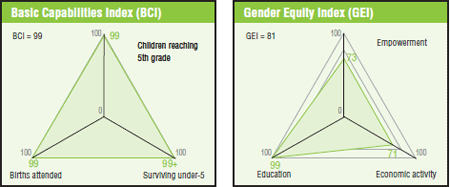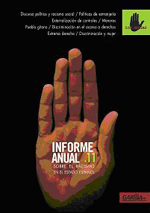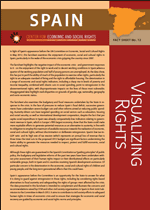Spain
Goals for 2030... and obstacles to achieving them Is the 2030 Agenda compatible with the neoliberal project? What happens in Spain in the current political context is a practical laboratory on how institutions, political parties and citizens are thinking about that question.
Any serious strategy and initiatives to adapt and implement the Sustainable Development Goals (SDGs) in Spain would have to incorporate several fundamental issues. Not so long ago, Spain’s commitment to the recognition of freedoms and rights in terms of equality were recognized; and its geographical and climatic conditions and technological development are sufficient to manage an energy transition towards models based on renewable resources. Its challenge in terms of employment however, suggests the need to explore productive transformation policies. There is room to expand fiscal policy given its low tax revenue in relation to neighbouring countries, and domestic rates of poverty and inequality require prioritizing specific policies in order to reduce them.

Published on Mon, 2019-05-13 12:09
Spain submitted its first Voluntary National Review in 2018 and the alternative report by La Mundial regrets the lack of dialogue on the SDGs between the government and stakeholders like academia and civil society. Spain is seen as starting late to take note of the 2030 Agenda and the High Level Group (GAN in its Spanish acronym) was perceived by civil society as not having the required political standing or participation of key ministries. Further, civil society feared that the policies required to achieve the SDGs would be undermined by the continuity of policies of fiscal austerity and shrinking rights that were pushing Spain away from the agreed goals and targets.
|
|
Source: 
. Published on Thu, 2017-07-13 15:09
La mayoría de países declaran su firme compromiso para lograr la igualdad entre hombres y mujeres y contra la violencia de género. Sin embargo, ninguno ha logrado alcanzar la una ni erradicar la otra.
|
Published on Mon, 2016-08-22 17:27
Spain is in a period of uncertainty about its future government and its institutions, political parties and citizens have not yet decided on a sustainable development strategy. To adapt and implement the Sustainable Development Goals (SDGs), Spain would need to renew its commitment to freedoms, rights and equality. The country has the capacity to transition towards renewable energy, but it needs to change social and economic policies to cope with dramatic unemployment. There is room to expand fiscal policy given its low tax revenue in relation to neighbouring countries, and domestic rates of poverty and inequality require prioritizing specific policies in order to reduce them.
|
Published on Thu, 2015-10-15 14:17
Plataforma 2015 y más, Social Watch focal point in Spain, launched the publication A research programme for Policy Coherence for Development Analysis. This study summarises a research programme based on a comprehensive view of Policy Coherence for Development using a multidimensional approach for human development. This programme studies coherence based on a quantitative analysis of public policy formulation, action and impact, complemented with quantitative research towards a Policy Coherence for Development Index (PCDI).
|
Published on Tue, 2014-10-07 10:27
The Spanish policy of international development cooperation is showing symptoms of exhaustion, says Plataforma 2015, the Spanish chapter of Social Watch, The crisis in Spanish cooperation policy affects the most vulnerable people and evidences a collective failure in respecting and protecting human rights.
These are problems of ethical and political nature and Spanish cooperation needs a reform consistent with the need for a global governance centered on guaranteeing the rights of all people of the world.
|
Published on Thu, 2014-04-10 22:15
Is European Union really committed to Human Development? EU has made an undeniable progress in promoting the integration of policy coherence for development (PCD) at the discursive level, nevertheless European policies developed in the last five years have not only had profoundly negative consequences for other countries and people, but have made living conditions significantly precarious for large part of the population living in Europe. There appears to be a more than significant gap between the policy commitments undertaken by the European institutions and Member States, and the real actions to promote greater PCD at both EU and national levels.
|
Published on Wed, 2012-05-16 09:26
The danger of policy measures designed to socialize the costs of the crisis have become painfully apparent in Spain, where the impacts of successive austerity budgets have resulted in deteriorating outcomes across a broad spectrum of human rights indicators, warned the Center for Economic and Social Rights (CESR) in a parallel report coordinated with 18 civil society groups for the UN Committee on Economic, Social and Cultural Rights’ 48th session, held earlier this month in Geneva.
|
Published on Mon, 2011-09-05 08:12

One of the protests last week
in Madrid. (Photo: sgcg.es)
|
Source: Plataforma 2015 y Más
The main union federations in Spain and many civil society organizations including Plataforma 2015 y Más (a member of Social Watch) established last week a programme of demonstrations to express their rejection of the change to the Constitution the governing Spanish Socialist Workers Party (PSOE) and the opposition Popular Party (PP) are contemplating. The change would set a limit to the public deficit, and the people’s organizations are calling for a public referendum to decide this matter.
|
Published on Fri, 2011-07-08 09:07

SOS Racismo
|
Sources (in Spanish): SOS Racismo, El Comercio, Ecuador, EFE, at Mugak, Cadena SER.
Racism and xenophobia have intensified in Spain under the influence of political forces and traditional parties that have assumed postulates until now restricted to the extreme right, warned the federation of non-governmental organizations SOS Racismo in its latest annual report. In recent months, “a time bomb” has been created, while “the political class fails as a whole; ones for playing the racist game and others for not condemning it enough”, said Alba Cuevas, the spokeswoman for the network in Cataluña.
|
Published on Wed, 2011-05-18 13:14

Photo: CCOO
|
Source: Plataforma 2015 y Más
Plataforma 2015 y Más [Platform 2015 and Beyond], one of the focal points of Social Watch in Spain, urged citizens to exert their right to vote with responsibility in the upcoming autonomic and municipal elections on Sunday 22. Thus, citizens were urged to vote for the options that include the defence of public policies in their programmes so as to ensure the State’s commitment to the eradication of poverty and inequalities.
|
Published on Thu, 2010-04-22 11:29
The Spanish Social Watch (SW) Coalition, constituted by Plataforma 2015 y más [Platform 2015 and Beyond] since 2006, joins the efforts of the social organizations which, within the global SW network, are working for sustainable human development and the fulfilment by governments of international agreements in the fight against poverty and inequality.
|
|












